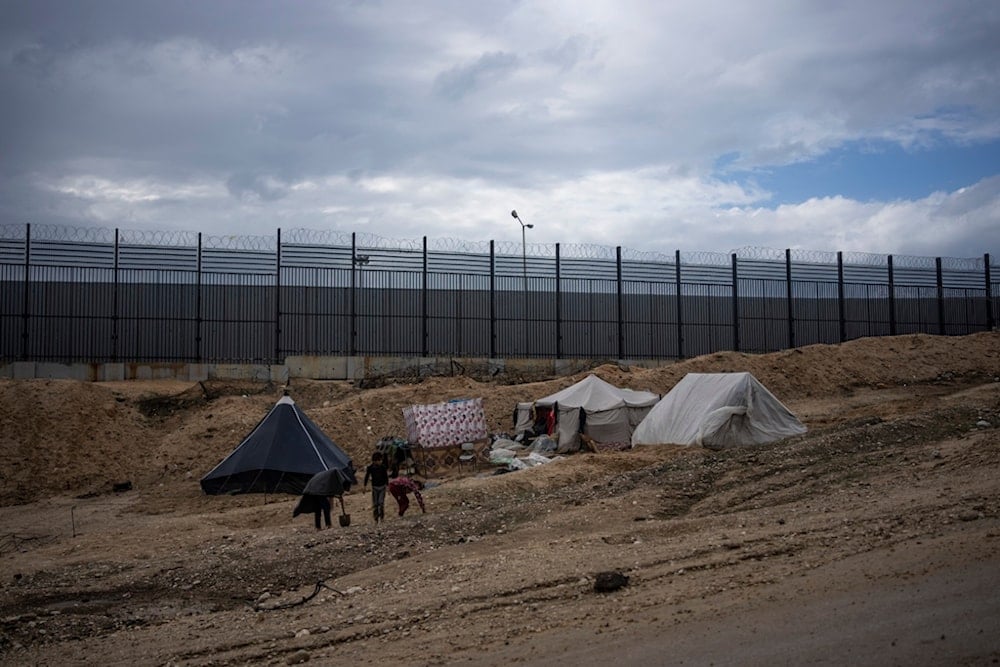Sources to Al Mayadeen: Egypt to not allow Israelis to invade Rafah
The sources detailed that Palestinian resistance factions praised the Egyptian decision and considered it a protection of borders and sovereignty, noting that Egypt is against the displacement project.
-

Palestinians displaced by the Israeli air and ground attacks on the Gaza Strip walk through a makeshift tent camp in Rafah on the border with Egypt, Saturday, Jan. 27, 2024 (AP Photo/Fatima Shbair)
Palestinian sources revealed to Al Mayadeen that Egypt informed Palestinian resistance factions it would not let the Israeli occupation invade the Palestinian-Egyptian border in Rafah, as it considers this an attack on Egyptian national security.
The sources detailed that Palestinian resistance factions praised the Egyptian decision and considered it a safeguard of borders and sovereignty, noting that Egypt is firm against the displacement project.
The Palestinian factions see the position of Egypt as one of the "most important" to prevent aggression on the border region.
Israeli control over 'Philadelphi Axis' threatens relations: Egypt
The head of the Egyptian Information Service, Diaa Rashwan, said on Monday, that the Israeli endeavor to control the "Philadelphi Axis" in the Gaza Strip along the border with Egypt is expected to threaten Egyptian-Israeli relations.
In a statement on the State Information Service (SIS) website, Rashwan said that "the recent period has seen numerous statements from Israeli officials, particularly Prime Minister Benjamin Netanyahu, making claims and false accusations regarding the alleged smuggling operations of weapons, explosives, ammunition, and other components into the Gaza Strip from Egyptian territory.
He further emphasized the Israeli persistence in promoting these falsehoods is an effort to justify its intent to seize control of the "Philadelphi Axis" or the Salah al-Din Corridor within the Gaza Strip along the border with Egypt. "This action constitutes a breach of the security agreements and protocols previously signed between him and Egypt."
Earlier this month, an Egyptian official denied any cooperation between Egypt and the Israeli occupation concerning the "Philadelphi Axis", confirming to Al-Qahera that media reports discussing such cooperation are unfounded.
The "Philadelphi Axis" is a region that extends from the Israeli-controlled Karam Abu Salem crossing, linking the Gaza Strip and occupied territories, to the southernmost point on the Gaza Strip's coast.
Also known as the "Philadelphi Route", the 14 km narrow strip of land separated Palestine from Egypt and was established as a buffer zone between "Israel" and Egypt in a 1979 treaty. Before the Strip was liberated in 2005, the Axis was under the control of Israeli occupation forces.
Initially, the Israeli occupation had intended to utilize its presence in the region as a method to prevent the transfer of materials and goods into the Gaza Strip, however, intricate tunnel systems eventually deemed it an ineffective method. As the occupation withdrew from the Gaza Strip, it concluded the "Philadelphi Accord" with Egypt, in which 750 Egyptian troops were allowed to be positioned alongside the border, to "maintain security."
A report by Reuters on Tuesday said that Egypt turned down a proposal from "Israel" seeking greater oversight over the buffer zone on the border with Gaza. Three Egyptian security sources disclosed that Egypt is prioritizing efforts to broker a ceasefire before delving into post-war arrangements.
The 13km (8 mile) border between Egypt and Gaza represents the only border of the Palestinian coastal enclave not directly controlled by "Israel." Egypt, along with Qatar, has been actively engaged in leading talks to facilitate a new ceasefire in Gaza and negotiating a deal for the release of Israeli captives.

 3 Min Read
3 Min Read








